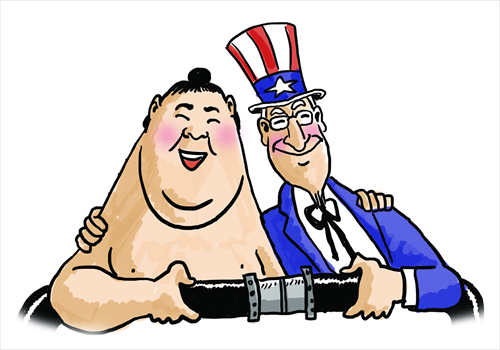HOME >> OP-ED
Japan targets secure energy from US
By Pang Zhongpeng Source:Global Times Published: 2013-10-29 1:33:00

Illustration: Liu Rui/GT
Japan's energy diplomacy is at a new crossroad, and it's high time for Tokyo to figure a way out.
Earlier this month, tens of thousands of people participated in a series of protests in central Tokyo, opposing government plans to restart nuclear reactors and calling for a nuclear-free society.
While the public stands firmly against nuclear power, "a nuclear-free society" sounds bitter for the Abe administration.
Zero nuclear power means relying once again on thermal power, which will prove a hefty burden for Japan. Lacking oil and gas itself, Japan will be forced to import colossal volumes of oil and gas, so as to guarantee the necessary fuel for thermal power operation.
In a bid to solve the country's energy crisis, vigorously boosting energy diplomacy has become the only option for the Abe administration. This year, Prime Minister Shinzo Abe has paid many visits abroad, and one of his top priorities is to find more channels for oil and gas imports.
Abe has visited the Middle East three times this year. In addition, he went to Russia, Southeast Asian countries, Mongolia, and also tried to get closer with Central Asian countries. He is also scheduled to visit Africa in 2014, seeking its affluent energy and resources. The key theme of all these visits is "energy."
Abe's visits to Canada and the US last month may indicate a turning point in the Japanese cabinet's mentality of energy diplomacy.
A core agenda of Abe's Canada trip was to negotiate cooperation over shale gas produced in Canada. In recent couple of years, an epoch-making "shale gas revolution" has taken place in the US. And both Canada and the US spare no efforts in producing shale gas. Japan's efforts to beef up cooperation over shale gas in North America hints a few possible changes.
Expanding gas imports from the US may be used by Tokyo to enrich the framework of US-Japan alliance, and facilitate Abe's efforts to strengthen US-Japan ties.
On October 3, the Japanese ministers of defense and diplomacy met their counterparts from Washington. During the meeting, the two sides proposed consolidating the US-Japan alliance. Shale gas may become their latest strong connection.
As the US is constantly scaling up shale gas production and Japan is eager to find a source for cheap and convenient source for oil and gas imports, the two will naturally engage in shale gas cooperation.
In May, several Japanese energy companies signed shale gas exploration and supply agreements with US states like Maryland and Texas. After 2017, the US will start to export liquefied shale gas to Japan, at an annual volume of 14.7 million tons, making up 20 percent of Japan's overall liquefied gas demand.
Japan will intensify its military presence in the Pacific area on the grounds of exporting shale gas from North America. In Japan's eyes, under the guise of ensuring the security of its energy import ships, it can reinforce communications facilities like radar on some Pacific islands.
This will kill three birds with one stone. As Japan is eagerly seeking to lift the ban on practicing self-defense right, this will serve as a new excuse. It will also help beef up the US-Japan alliance, since sea routes in the Pacific have been dominated by the US navy. In addition, the move will contain China's maritime development in the Pacific.
On October 6, Japan's Defense Minister Itsunori Onodera inspected the island of Iwo Jima, an important hub in the Pacific area. He said a communications facility on the island will be established as soon as possible, so as to supervise neighboring countries that are increasingly active in the Pacific.
The peaceful environment in the Pacific will be threatened, if Japan prioritizes North America in its strategy of energy diplomacy. Tokyo and Washington will regard the Pacific as their common sphere of influence.
During an APEC ministerial meeting on October 5, Japanese Foreign Minister Fumio Kishida raised the issue of "ensuring the freedom of navigation," which actually means primarily ensuring Japanese and US freedom of navigation in the Pacific. But in fact, in this vast ocean, most areas are high seas, in which every country enjoys rights and freedom in accordance with international law.
The author is a scholar of Japan studies at the Chinese Academy of Social Sciences. opinion@globaltimes.com.cn
Posted in: Viewpoint